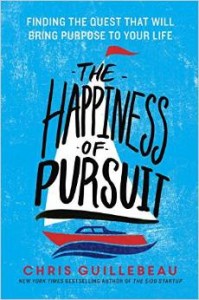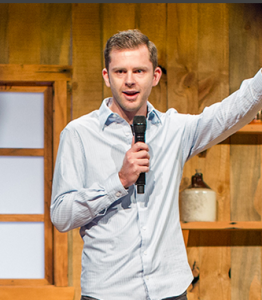 This week I’m reading Chris Guillebeau‘s freshly published book: The Happiness of Pursuit: Finding the Quest that Will Bring Purpose to Your Life.
This week I’m reading Chris Guillebeau‘s freshly published book: The Happiness of Pursuit: Finding the Quest that Will Bring Purpose to Your Life.
I’ve been a longtime follower of Chris’s blog, The Art of Non-Conformity, and he even did a Q&A post for our site about his last book, The $100 Startup.
What I love about Chris’s approach to Life, the Universe, and Everything is his go-get-it attitude about the things that matter to him. He’s designed a life and completed a quest that works for him and his personality. This new book is about his quest to visit all the countries in the world by the time he was 35, and about the many people he met along the way that were pursuing quests of their own.
In talking with others and looking at his own experience, Chris gleaned a number of useful lessons and insights about creating and pursuing quests.
And although the focus of the book is generally on more external pursuits, I can’t help thinking there’s are great lessons to be learned for our writing lives as well. There are certainly some useful parallels to draw between quests and writing, as you’ll see below.
Let’s talk about some of the lessons that have stood out to me so far in what I’m reading:
1. “When you sense discontent, pay attention.” Discontent is a powerful informant about what’s not working in your life . . . but it’s not enough on its own to spark a quest or change. Chris says, “If you want to get the embers burning, you have to blend dissatisfaction with inspiration, and then you have to connect the dissatisfaction to a greater purpose.”
This is his equation for transmuting dissatisfaction:
Dissatisfaction + Big Idea + Willingness to Take Action = New Adventure
I’ve definitely found discontent to be a great source of information in my own life about what’s not working and what I’d like to change, but it was my willingness to do something about it that really made the difference, particularly in my major career shift from urban design to coaching and ultimately to writing.
2. “A true calling involves trade-offs.” A dream that calls you — whether it’s creating something or traveling the world — will require a deeper investment or even sacrifice — but it will feel worth it to you because you’re called to do it.
Making the time to write often involves a sacrifice or trade off for me, but almost always feels worth it. And I’m certainly willing to make hard choices about fulfilling other dreams of mine in order to make them happen (from staying home with the kids to traveling the world).
3. Refuse to give your fear decision-making authority. Making headway into new territory will trigger fear. As Chris says, “Embracing new things often requires us to embrace our fears, however trivial they may seem. You deal with fear not by pretending it doesn’t exist, but by refusing to give it decision-making authority.”
Any big dream will trigger fear — and Chris is absolutely right that we cannot allow it to dictate our decisions.
4. Have an emotional awareness of mortality. Chris differentiates between an intellectual awareness of mortality versus an emotional one.
Here’s how he breaks it down:
- Intellectual awareness: “I know that no one lives forever.”
- Emotional awareness: “I know that I will someday die.”
I’ve always been vaguely annoyed by the notion to “live each day as if it’s your last”, because I’m pretty sure I wouldn’t be emptying the dishwasher if it was my last day on Earth. But Chris’s notion here, of having an emotional awareness, points to something more meaningful for me.
It’s about having a sense of personal motivation to make the most of the time we are individually given, by adopting greater goals and pursuits that bring a sense of meaning and fulfillment into our lives. That version works for me.
5. Make your personal passions your quest. A quest, as Chris defines it, includes a clear goal, a real challenge, and set of milestones along the way, and something that involves some kind of investment or sacrifice. He doesn’t include writing a book as a quest, though he defines that as a “general life improvement” along with other things like getting out of debt, getting in shape, quitting smoking. Those, he says, are not necessarily true quests.
The examples of quests given in the book range from his own (traveling to all the world’s countries), a woman’s goal of making a meal from every country for her family, a teen earning every Boy Scout merit badge, and a man using walking as an only means of transportation for 17 years (and not speaking either for that length of time as well).
More to come…
The rest of the book contains what looks like more delightful examples of other people’s quests, along with some in depth chapters I’m particularly looking forward to reading.
There’s one called “The Love of the Craft”, which I think will be right up my alley, with some writing examples, including Seth Godin.
Can writing be a quest?
It occurs to me that writing could still be a quest by Chris’s definition — perhaps by setting a goal of some kind around it, like a certain number of books or screenplays written by a certain date, or like Seth Godin, writing 365 days per year. What do you think? Take a look below for an opportunity to submit your answer about how writing might look like a quest for you . . . and get a chance to win a copy of Chris’s book!
About Chris
 During a lifetime of self-employment that included a four-year commitment as a volunteer executive in West Africa, Chris visited every country in the world (193 in total) before his 35th birthday. Since then he has modeled the proven definition of an entrepreneur: “Someone who will work 24 hours a day for themselves to avoid working one hour a day for someone else.”
During a lifetime of self-employment that included a four-year commitment as a volunteer executive in West Africa, Chris visited every country in the world (193 in total) before his 35th birthday. Since then he has modeled the proven definition of an entrepreneur: “Someone who will work 24 hours a day for themselves to avoid working one hour a day for someone else.”
Chris’s first book, The Art of Non-Conformity, was translated into more than twenty languages. His second book, The $100 Startup, was a New York Times and Wall Street Journal bestseller, selling more than 300,000 copies worldwide. His latest book, The Happiness of Pursuit, will be published by Crown / Random House in September 2014.
Every summer in Portland, Oregon, Chris hosts the World Domination Summit, a gathering of creative, remarkable people with thousands in attendance. Chris is also the founder of Pioneer Nation, Unconventional Guides, the Travel Hacking Cartel, and numerous other projects.
Read Chris’s favorite writing tips here: http://chrisguillebeau.com/good-writing-tips
Meet Chris
You can meet Chris on his tour of 40+ cities in North America. Find out more here: http://chrisguillebeau.com/events
Win a Copy of The Happiness of Pursuit
Pick up your own copy of The Happiness of Pursuit, on Amazon *, Barnes & Noble, and indie bookstores in hardback, paperback, or ebook form.
Thanks for reading!
* Affiliate link
